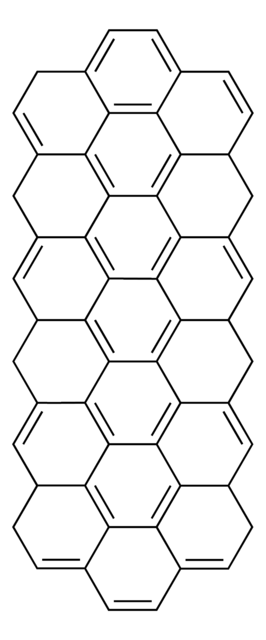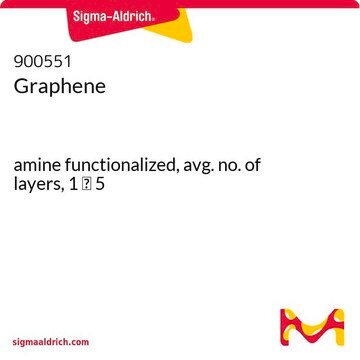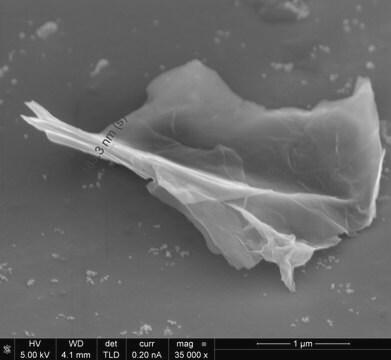924458
Graphene, monolayer film
for battery, Bio-sourced
Synonym(s):
Battery graphene, Green alternative graphene, rGO
About This Item
Recommended Products
product name
Single-layer graphene sheets for battery, Bio-sourced, avg. no. of layers, 1
Quality Level
description
ID/IG: 0.84; I2D/IG: 1.66; Horiba instrument - Laser 532 nm, Hole 349.983, Grating 1800, Filter 5%, Acquisition time 3s, Accumulations 5, Objective 100X_VIS
Stability: >3000 °C in inert (TGA)
feature
avg. no. of layers 1
greener alternative product characteristics
Design for Energy Efficiency
Use of Renewable Feedstocks
Learn more about the Principles of Green Chemistry.
surface area × surface area
1155.3 m2/g × 69 m2/g
impurities
<0.075% Residual Acid Content (EDS and XPS)
<0.15% Oxygen content
particle size
≤64 μm (ASTM Sieve analysis)
pore size
1.7 cm3/g±0.22 cm3/g pore volume
solubility
water: insoluble
bulk density
0.15‑0.18 g/cm3
greener alternative category
General description
The capacity of our anode after charging at 10 C ( minutes) is similar to graphite capacity at a charge rate of 0.1 C (i.e. 10 hours charging time). It can charge in a few minutes instead of hours, and showed a 5X increase in capacity at 0.1C vs. graphite anode (standard).
Our bio-sourced graphene is manufactured through an unique environmentally friendly non-oxidizing process that involves plant-based raw materials.
Application
Due to its superior properties, the alpha grade graphene have applications in:
1. Additives for light weight composites which require high specific strengths
2. Transparent, flexible and conductive applications unique to Photo Voltaic Solar cells
3. Oxidation-resistant anti-corrosion coatings
4. Ultra-filtration and separation barriers
5. Anode and cathode materials for lithium-ion batteries;
6. Conductive coatings for battery electrodes
7. Electrically conductive inks got printed electronics
8. Additive for super-strong, hydrophobic concrete
9. Electronic and optoelectronic devices
Storage Class Code
11 - Combustible Solids
WGK
WGK 3
Certificates of Analysis (COA)
Search for Certificates of Analysis (COA) by entering the products Lot/Batch Number. Lot and Batch Numbers can be found on a product’s label following the words ‘Lot’ or ‘Batch’.
Already Own This Product?
Find documentation for the products that you have recently purchased in the Document Library.
Our team of scientists has experience in all areas of research including Life Science, Material Science, Chemical Synthesis, Chromatography, Analytical and many others.
Contact Technical Service






